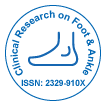开放获取期刊获得更多读者和引用
700 种期刊 和 15,000,000 名读者 每份期刊 获得 25,000 多名读者
索引于
- 谷歌学术
- 夏尔巴·罗密欧
- 打开 J 门
- 学术钥匙
- 参考搜索
- 哈姆达大学
- 亚利桑那州EBSCO
- OCLC-世界猫
- 普布隆斯
- 日内瓦医学教育与研究基金会
- 欧洲酒吧
- ICMJE
有用的链接
开放获取期刊
分享此页面
抽象的
Treatment of Intense Horizontal Lower Leg Tendon Burst in the Competitor
Jakob Ryan
Intense parallel lower leg tendon injuries are normal in youthful competitors (15 to 35 years old). Demonstrative and treatment conventions differ. Treatments range from cast immobilization or intense careful fix to practical recovery. The parallel tendon complex incorporates 3 capsular tendons: the Front Tibiofibular (ATFL), Calcaneofibular (CFL) and Back Talofibular (PTFL) ligaments. Wounds regularly happen during plantar flexion and reversal; the ATFL is generally regularly torn. The CFL and the PTFL can likewise be harmed and, after serious reversal, subtalar joint tendons are likewise impacted. Intense parallel lower leg tendon injuries are normal in youthful competitors (15 to 35 years old). Demonstrative and treatment conventions differ. Treatments range from cast immobilization or intense careful fix to useful recovery. The parallel tendon complex incorporates 3 capsular tendons: the foremost Tibiofibular (ATFL), Calcaneofibular (CFL) and Back Talofibular (PTFL) ligaments. Wounds regularly happen during plantar flexion and reversal; the ATFL is generally normally torn. The CFL and the PTFL can likewise be harmed and, after serious reversal, sub talar joint tendons are additionally impacted. Regularly, a competitor with a parallel lower leg tendon injury reports having turned over' the beyond their lower leg. The whole lower leg and foot should be inspected to guarantee there could be no different wounds. Clinical security tests for ligamentous disruption incorporate the foremost cabinet trial of ATFL capability and reversal slant test of both ATFL and CFL capability. Radiographs might preclude treatable cracks in extreme wounds or when agony or delicacies are not related with sidelong ligaments. Stress radiographs don't influence treatment.

 English
English  Spanish
Spanish  Russian
Russian  German
German  French
French  Japanese
Japanese  Portuguese
Portuguese  Hindi
Hindi